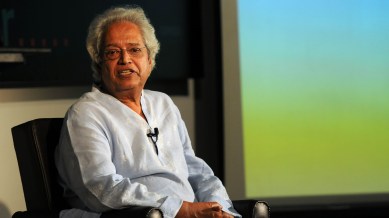Stay updated with the latest - Click here to follow us on Instagram
Sudhir Kakar, ‘father of Indian psychoanalysis’, dies at 85
Kakar turned to fiction late in life, with themes overlapping with his research.

Celebrated psychoanalyst Sudhir Kakar was also a great table tennis player. Vikram Lal, former CEO of Eicher Motors, who lived in his Delhi locality in the 1970s, recalls that he won several state-level trophies growing up in Rajasthan. They played together sometimes, but it was their proximity at a time when there weren’t many young couples in the area, and his wife’s interest in psychology, that sealed their lifelong friendship – one that would witness Kakar’s rise as the ‘father of Indian psychoanalysis’, becoming one of the sole practitioners of the discipline in India. Kakar died Monday at the age of 85.
The author of more than 20 non-fiction and fiction works, he was interested in sexuality, mysticism and religion as a counterpart to modern-day globalisation. He studied Freud and applied him to everything from film criticism to psychotherapy to mythology, considering Hindi cinema a producer of “new myths” and “collective fantasies” that came to India’s rescue during great sociopolitical and economic upheaval. Kakar called the phenomenon a “humble representative of the Hindu cultural ideal.”
monthly limit of free stories.
with an Express account.
One of his oldest friends, art critic Alka Pande, recalls his translation of Kamasutra (2015) and essay of her 2014 exhibition on the same as an instance of how their conversations about the psychology of art enriched her. “He was a great enjoyer of life. He had a cigar and drink of vodka every evening, and loved going to the beach. He was always very open and generous with what he knew,” she says.
The Inner World (1978) was one of Kakar’s first major works, decoding how Hindu mythology affected Indians on a daily, intimate and societal level, with later works like Shamans, Mystics and Doctors (1990) and The Indians: Portrait of a People (2007) touching similar ground. “He was interested in interpreting Indian society to the West, but it was very interesting to us Indians too,” said Lal.
Kakar was interested in the interaction of religion and politics, with political scientist Ajay Gudavarthy writing in a 2020 piece how Kakar observed that “rumours of poisoned milk being sold are spread during communal riots” because milk symbolises a “primordial maternal security”, capable of arousing “fear, insecurities and a primordial instinct for violence.” In a 2006 interview, Kakar said, “The Indian worldview is very romantic and uncynical… Life is seen as tragic, but there’s an order, and if one has gone about one’s life conscientiously one will arrive at the positive… Astrologers are psychotherapists for the majority of Indian society. They do the same thing: draw up a scenario, explain the connections, offer… solutions.”
Kakar turned to fiction late in life, with themes overlapping with his research. He debuted with The Ascetic of Desire (1998), about the third-century author of Kamasutra, and followed it with Ecstasy (2001), about a man who wakes up one morning having grown breasts. He returned to spirituality with The Devil Take Love (2015), about the seventh-century poet Bhartṛhari, and wrote The Kipling File (2018), about the English novelist Rudyard Kipling. His first wife, Apeksha, recalls how his first manuscript, The Heavy Knife, was never published but she got a peek at it when he was wooing her in the 1960s at a party in her uncle’s home. “When I met him, he was quite a charmer but very shy and selective of his conversations. He read a lot and always knew what he wanted out of his career and future. But he wasn’t like men today who share their household duties with their wives… He was quite self-absorbed but gentle and soft-spoken, not aggressive…” she said.
On his death, poet Ranjit Hoskote said, “I was heartbroken to hear of Sudhir’s passing. He was so much on my mind in recent months.” Writer Gurcharan Das said, “His death came as a shock. He was intellectually generous and very warm. I remember sitting on the beach with him and chatting as we watched the sun set. We were both classical liberals, not left liberals or neoliberals, and he sympathised with my opinion that India only got its economic freedom in 1991. He shared my concerns about liberalism and the problems of dissent today.”
Preeta Singh, president of Teamwork Arts, was a patient of his and got to know him closely when she started playing bridge with Apeksha, not knowing they were married. “He was a man of very few words and an astute observer, very intellectually alive. He brought up two lovely kids who have done very well and are proud of their father,” she said.
Kakar was not just a psychoanalyst and table tennis player – he was also an engineer and economist, having done a bachelor’s in the former and doctorate in the latter. He taught at the Indian Institute of Technology, Indian Institute of Management and Jawaharlal Nehru University, as well as multiple foreign colleges, but it was an encounter with veteran psychoanalyst Erik Erikson while he was in India researching a biography on Gandhi that started him on this journey. “Eriksen was leaving Ahmedabad and boarding the plane, when Sudhir ran up to him and said he wanted to study psychoanalysis,” says Apeksha. “Eriksen said okay, and asked him to come to the United States. Sudhir followed him.”